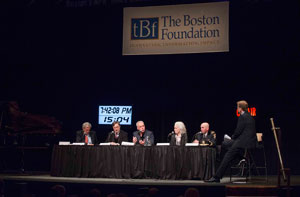Boston After the Bombing: A Public Conversation of Hope and Healing
April 24, 2013
 |
Boston Globe columnist Kevin Cullen said “I was stunned like anyone else and then I was angry… it seemed like a low, cheap blow. [Bombs] in a pressure cooker. On a sidewalk. With kids standing all around.” But, he said, “The power that was unleashed by the first responders was more powerful than any single bomb.”
Dr. Stavas and Mr. Cullen were panelists who participated in a live community event at the Cutler Majestic Theater on April 24 sponsored by the Boston Foundation and WBUR-FM. The program, called “Boston After the Bombing: A Public Conversation of Hope and Healing” and open to the public, was broadcast live.
Imam Suhaib Webb of the Islamic Society of Boston Cultural Center, said he was distressed to be branded an “Al Qaeda operative” on Fox News a week after the bombing. He said he felt he was the object of 360-degree hatred, “but then I received a phone call from the Rev. [Ray] Hammond [and others] and I realized that Boston is better than all of this.”
“We see this crisis through your eyes, through the eyes of the community, not through the eyes of the killers,” said Imam Webb. “We’re Bostonians.”
Referring to one of the alleged bombers who became enamored of a toxic strain of Islam on the Internet, Webb pointed out that the young man’s mosque in Cambridge had taken issue with his views. “Radicalization is happening outside the Muslim community, not in it,” he said.
Dr. Eli Newberger, a child trauma expert at Boston Children’s Hospital, said that while some children may seem to be doing fine, “it’s important to know that even though they may be fine 9 days out, sometimes the effects of trauma manifest themselves weeks and months out.”
City Councilor Ayanna Pressley urged anyone in immediate need of help to call the city help line at 617-534-5050. Barbara Ferrer, Executive Director of the Boston Public Health Commission, said she wants those injured on Patriot’s Day and their families to know “we’re here as long as they need help.”
Paul S. Grogan, President and CEO of the Boston Foundation, said, “What was so insidious about this is it took the best of Boston, the best of cities, and converted it to a tragedy.” He said it will be important for the city, moving forward, “not to capitulate to fear.”
Daniel Linskey, Superintendent in Chief of the Boston Police Department, walked the audience through the department’s response to the bombings, ending with officers providing first aid to a dying Tamerlan Tsarnaev – one of the suspects -- on the streets of Watertown. “We gave him medical care and tried to save his life even though he killed children and women in our city and even though he’d tried to kill one of our officers.”
“We’re better than him,” Linskey said simply.
Click below to listen to the broadcast.
